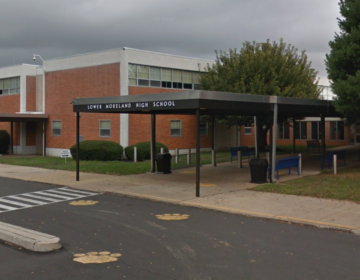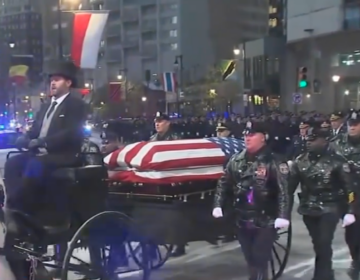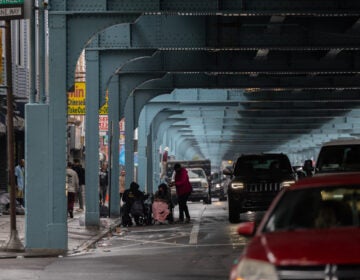New survey finds Philadelphians feel police aren’t keeping them safe
More than 90% of Philadelphians surveyed in a new poll from a coalition of community-based groups say they support redistributing money from police toward social services.
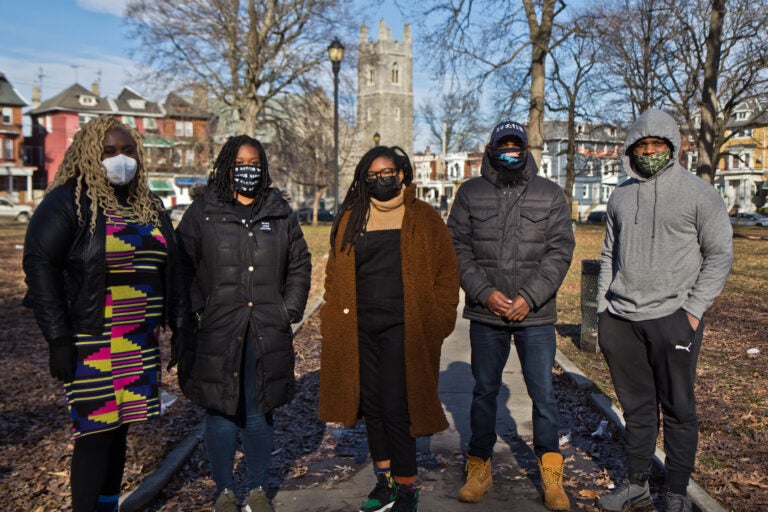
(From left) Nikki Grant, with the Amistad Law Project, Kendra Van de Water with YEAH Philly, Clarise McCants with the Movement Alliance Project, and James Aye and Kameron Troy with YEAH Philly, at Malcolm X Park in West Philadelphia. (Kimberly Paynter/WHYY)
More than 90% of Philadelphians surveyed in a new poll from a coalition of community-based groups say they support redistributing money from police toward social, health, and housing programs.
The polarizing phrase “defund the police” became a hallmark of protests over the 2020 police killings of Black men and women George Floyd, Breonna Taylor, and Walter Wallace Jr. But the community-based organization set out with their poll to quantify public support for redirecting police funding to other city services and better understand where people wanted to see investment.
Clarise McCants, a native Philadelphian, and organizer with the Movement Alliance Project, one of the groups behind the survey, said the protests that brought out thousands of people last year made clear that many residents wanted to reimagine public safety. Three-quarters of the survey’s 1,300 respondents said police were bad or very bad at preventing violence in their neighborhood.
“[This] can be the start of the conversation around like, okay, we actually see where people stand and what kind of support exists for policies that would create more opportunities to invest in things that people actually need in order to address the root causes of violence,” said McCants.
More than half of respondents wanted to see more funding for education and youth programming and closer to 60% wanted to see more investment in housing and stability assistance, as well as centers for mental health and addiction recovery. Nearly 80% said housing has historically prioritized the least out of a number of public city services.
Karina Jimenez, an immigrant who owns a Philadelphia business, took the survey. She said feeling criminalized while driving or working doesn’t make communities safer.
“Funding the initiatives that do keep us safe, like schools, housing assistance, and ensuring small businesses like mine make it out of this pandemic – will be what help us grow,” she said.
Movement Alliance Project and a diverse coalition of local nonprofits like Juntos, VietLead, and the Philadelphia Community Bail Fund partnered to create and distribute the survey. But surveying people during the pandemic was difficult and McCants acknowledged the group struggled to get a representative sample of city residents. The result is a mostly online poll in which just 16% of respondents were Black, while 57% were white.
Census data shows Black residents make up 42% of Philly’s population.
And while over-policing disproportionately impacts people of color, the survey data showed that out of 600 respondents who had called for police, 56% of Black respondents said that police were “helpful” when called. A majority of white respondents said they were not helpful.
“We’ve been hearing from a lot of folks and elected officials and other people, Black people do not want to move away from policing because they’re the ones who more severely bear the brunt of the impact of gun violence,” McCants said. The longtime organizer said she was not surprised by Black residents’ responses.
She noted that 68% of Black residents surveyed also said police were somewhat or very bad at preventing violence. Across racial lines, two-thirds of people surveyed said there had been a shooting in their neighborhood.
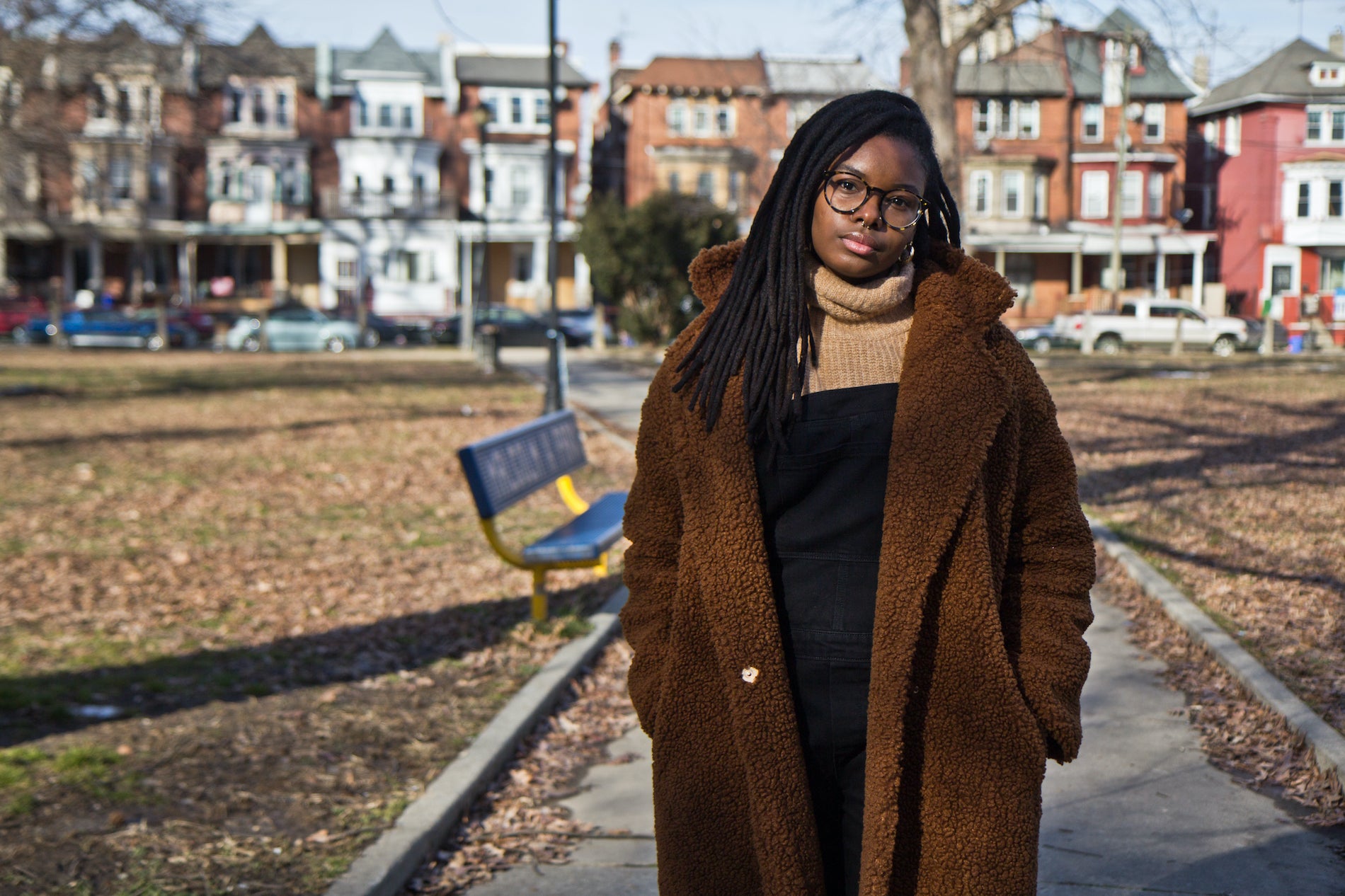
Philadelphia set a record for homicides last month and the deaths continue. At least eight people were shot Wednesday afternoon at the busy intersection of Broad Street and Olney Avenue, near Olney Transportation Center. It was the second mass shooting in Philadelphia since the new year began last month, according to the Gun Violence Archive.
Wysenia Williams was not one of the respondents but she has an opinion on public safety that she has worked hard to be heard. For the past two years, she’s asked for increased police presence in North Philly’s Poplar neighborhood, where she resides.
“I stood in the middle of the street begging for police. Like we need help out here can someone hear our cry?” she said.
Williams said she does agree that city services, like mental health programs and workforce development, that could address the root causes of violence are underfunded and that she also marched in summer protests calling to end police brutality. But she also said in communities like hers, having police patrol violent street corners helps stop shootings.
“I asked for police to sit there because once the police are sitting there, they don’t shoot,” she said. “If you notice when you leave, they shoot, why wouldn’t we have 24-hour police protection?”
Councilmember Jamie Gauthier has seen more nuanced conversations play out about policing in her West and Southwest Philly district, too. Not everyone wants to “get rid of the police,” said Gauthier of her constituents but they are looking for changes to public safety.
“They recognize that their neighborhoods need more than police,” she explained. “They need a variety of investments that can help people. They also realize that we need investment in people and those are the things that are going to drive down violence.”
Solutions are there, ‘we just have to listen’
The city is now facing a half-billion-dollar funding hole, and painful cuts to city services are likely. The police department’s $720 million budget is the largest of any city agency and, despite steady increases over the years, has not blunted a rise in homicides, which hit a 30-year high in 2020 as arrests and clearances by homicide investigators declined. The police union has blamed the trend on the policies of progressive District Attorney Larry Krasner.
Just last week, the mayor agreed to acknowledge a resolution to declare a state of emergency over gun crime. In general, discussions about reducing police funding with elected officials are difficult, McCants said.
“They were just like, ‘Y’all, like people just don’t support this, so I don’t understand why y’all are even bringing this to us. It’s like no viable way to move this,’” she said.
McCants said the response suggested elected officials thought residents didn’t understand the demands organizers were making when they called for changes in the police budget. So, her group hopes to use the survey as the first step in a campaign called “Safety We Can Feel,” aimed at raising public awareness and, ultimately, pushing elected officials toward redistributing police funding.
“The reason that we’re kind of embarking on this work is to lift up the idea that communities actually know exactly what they need and they already have the solutions that we’re looking for, but we just have to listen to them,” McCants said.
National polling on the issue has proven mercurial, with some showing broad opposition and others showing more support when the policy was framed as redistribution. Some cities have made moves in that direction. Seattle Mayor Jenny Durkan signed a city budget in December that included an 18% cut to the city police funding.
McCants credits the survey responses to the Philadelphia Police Department’s local history — from the 1985 MOVE bombing in West Philadelphia to the firing of more than a dozen officers for racist and offensive Facebook posts to last summer’s tear gassing of residents in West Philly, I-676, and Kensington.
McCants said the Safety We Can Feel campaign aims to have a more in-depth report for the city by the end of the year with solutions they want to be implemented to create safer communities. Throughout the year, the organizations involved plan to conduct polls that better connect with hard-to-reach communities. But for now, McCants said this poll is aimed at letting officials know what residents want to be prioritized in Philadelphia, and moving toward changes in city spending.
“Affordable housing, mental health services, schools, community-based violence prevention, youth programming, workforce development, arts and culture, like all these different things that are part of the pillars of what keep our communities feeling like home,” McCants said.

Subscribe to PlanPhilly
WHYY is your source for fact-based, in-depth journalism and information. As a nonprofit organization, we rely on financial support from readers like you. Please give today.



